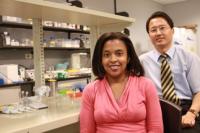Aug 12 2010
Two NJIT biomedical researchers have received the prestigious Coulter Foundation Translational Awards for promising patent applications that may some day extend peoples' lives.
The Coulter program provides funding for professors in established biomedical engineering departments within the U.S. Initial funding for each professor will be at least $200,000 over a two-year period.
NJIT Associate Professor Treena Arinzeh will receive funding for her patent application to create an electro-spun composite material for bone repair applications. Her composite material can be combined with stem cells to enhance the rate of bone repair.
 Shown in the laboratory are Treena Arinzah (left) and Cheul Cho, two NJIT biomedical researchers who have received the prestigious Coulter Foundation Translational Awards for promising patent applications.
Shown in the laboratory are Treena Arinzah (left) and Cheul Cho, two NJIT biomedical researchers who have received the prestigious Coulter Foundation Translational Awards for promising patent applications.
NJIT Assistant Professor Cheul Cho will receive support for his patent application for an extracorporeal bio-artificial liver assist device with human stem cell-derived hepatocytes for the treatment of liver failure. His project aims to differentiate human embryonic stem (ES) cells into functional hepatocytes and to evaluate their therapeutic efficacy in a bio-artificial liver (BAL) for the treatment of acute liver failure. Current potential cell-based therapies and extracorporeal BAL devices for the treatment of liver failure are severely limited by the low availability of functional human liver cells, called hepatocytes.
Arinzeh's research focuses on tissue engineering, the application of principles and methods of engineering and life sciences toward a fundamental understanding and development of biological substitutes to restore, maintain and improve human tissue functions. Bone regeneration may be achieved by the use of osteogenic cells and/or factors to induce bone growth in combination with an appropriate scaffold to guide and support the laying down of new bone tissue.
Optimally, a scaffold for bone tissue engineering should satisfy the following minimum requirements, she said. It must be biocompatible, able to coexist with living tissues or organisms without causing harm. It must have osteoconductivity, able to serve as a scaffold or matrix on which bone cells may attach, migrate and form new bone. It should have minute openings, pores or holes, so that bone can grow inside the material. It should be biodegradable, able to break down in the body without causing harm. And, it should have mechanical integrity—the ability to hold together and withstand chemical, physical, and biological forces.
Cho's research focuses on designing a clinically-scaled bio-artificial liver. Approximately 10 percent of the liver mass is necessary to support a patient with acute liver failure, which is a critical limitation for many cell-based therapies for liver failure.
Embryonic stem cells are considered a potential source of cells for hepatic therapies due to their limitless capacity for self-renewal and proliferation, and their ability to differentiate into all major cell lineages.
Cho's novel method differentiates embryonic stem cells into hepatocytes with high purity. Incorporating these cell-derived hepatocytes into a device to treat fulminant hepatic failure has improved animal survival, thereby underscoring the cells' therapeutic potential. (A provisional patent was also filed for this project.)